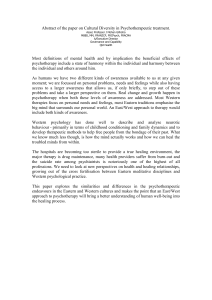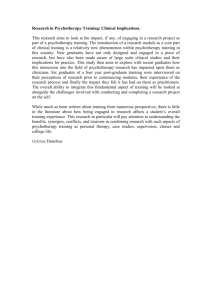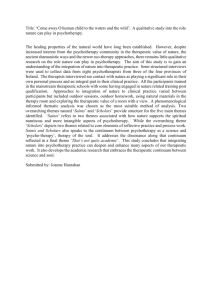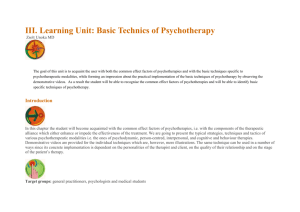Sample Registration Requirements
advertisement
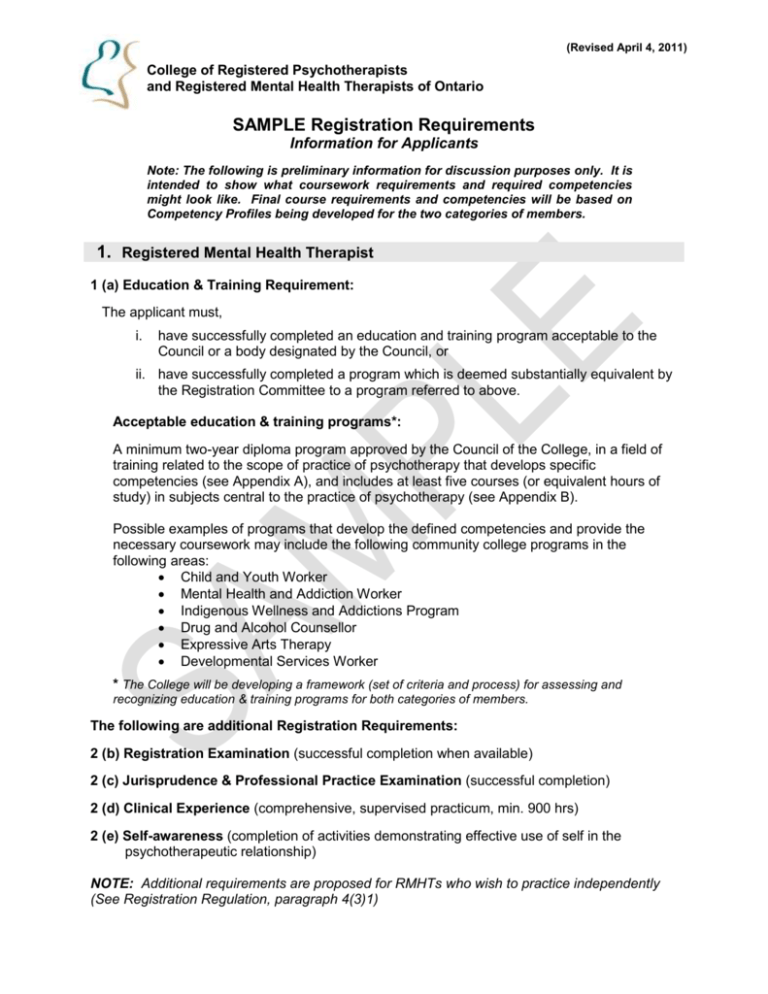
(Revised April 4, 2011) College of Registered Psychotherapists and Registered Mental Health Therapists of Ontario SAMPLE Registration Requirements Information for Applicants Note: The following is preliminary information for discussion purposes only. It is intended to show what coursework requirements and required competencies might look like. Final course requirements and competencies will be based on Competency Profiles being developed for the two categories of members. 1. Registered Mental Health Therapist 1 (a) Education & Training Requirement: The applicant must, i. have successfully completed an education and training program acceptable to the Council or a body designated by the Council, or ii. have successfully completed a program which is deemed substantially equivalent by the Registration Committee to a program referred to above. Acceptable education & training programs*: A minimum two-year diploma program approved by the Council of the College, in a field of training related to the scope of practice of psychotherapy that develops specific competencies (see Appendix A), and includes at least five courses (or equivalent hours of study) in subjects central to the practice of psychotherapy (see Appendix B). Possible examples of programs that develop the defined competencies and provide the necessary coursework may include the following community college programs in the following areas: Child and Youth Worker Mental Health and Addiction Worker Indigenous Wellness and Addictions Program Drug and Alcohol Counsellor Expressive Arts Therapy Developmental Services Worker * The College will be developing a framework (set of criteria and process) for assessing and recognizing education & training programs for both categories of members. The following are additional Registration Requirements: 2 (b) Registration Examination (successful completion when available) 2 (c) Jurisprudence & Professional Practice Examination (successful completion) 2 (d) Clinical Experience (comprehensive, supervised practicum, min. 900 hrs) 2 (e) Self-awareness (completion of activities demonstrating effective use of self in the psychotherapeutic relationship) NOTE: Additional requirements are proposed for RMHTs who wish to practice independently (See Registration Regulation, paragraph 4(3)1) 2. Registered Psychotherapist 2 (a) Education & Training Requirement: The applicant must: i. have successfully completed an education and training program acceptable to the Council or a body designated by the Council, or ii. have successfully completed a program which is deemed substantially equivalent by the Registration Committee to a program referred to above. Acceptable education & training programs*: A program of training or education approved by the Council of the College that develops specific competencies (see Appendix A), and includes at least 10 courses (or equivalent hours of study) in subjects central to the practice of psychotherapy (see Appendix B). An approved program will normally have, as an entrance requirement, a pre-requisite undergraduate degree. Examples of programs requiring an undergraduate degree as an admission requirement, which develop the defined competencies and provide the necessary coursework may include the following: Master of Art Therapy Master of Counselling Psychology Master of Counselling & Spirituality Master of Education (Counselling Psychology /Educational Counselling) Master of Marriage and Family Therapy Professional Training Programs in Psychotherapy (independent training institutes) * The College will be developing a framework (set of criteria and process) for assessing and recognizing education & training programs for both categories of members. The following are additional Registration Requirements: 2 (b) Registration Examination (successful completion when available) 2 (c) Jurisprudence & Professional Practice Examination (successful completion) 2 (d) Clinical Experience (min. 450 direct client contact hrs) 2 (e) Supervision (min. 150 hrs clinical supervision related to client contact hrs) 2 (f) Self-awareness (completion of activities demonstrating effective use of self in the psychotherapeutic relationship) NOTE: Minimum 1000 client contact hrs are proposed for Registered Psychotherapists who wish to practice independently. GRANDPARENTING: It is expected that, initially, many members will be ‘grandparented.’ This is an alternative route to registration for established Ontario practitioners who may not meet the full registration requirements. This option will be open for two years following proclamation of the Psychotherapy Act, 2007. For details, see the draft Registration Regulation or the table, Summary of Proposed Registration Requirements, posted on our website. 2 APPENDIX A Preliminary List only (subject to change) PROPOSED COMPETENCIES * Foundational Principles: Competency to: 1.1 Apply a theory of human functioning (e.g. human development, sexuality, spirituality, moral reasoning, etc.) 1.2 Work within a framework based upon recognized, outcome-informed psychotherapeutic theory 1.3 Maintain awareness of self in relation to professional role 1.4 Apply knowledge of human and cultural diversity Professional Practice and Ethics: Competency to: 3.4 Apply an ethical decision-making process 3.9 Practice in a manner consistent with the role of the therapist within the health care system (DSM, referral, classes of psychotropic drugs, etc.) 3.13 Maintain appropriate professional practices e.g. record-keeping, appointments book, etc. 3.14 Comply with legal obligations, e.g. reporting child abuse 3.15 Establish business practices relevant to the role Therapeutic Process: Competency to: 4.1 Orient client to therapist’s practice 4.2 Establish and maintain core conditions, consistent with selected theory and practice (e.g. boundaries, empathy, active-listening, etc.) 4.3 Obtain and integrate multiple levels of information during the therapeutic process (e. initial and ongoing assessment) 4.4 Conduct an appropriate risk and resource assessment 4.5 Maintain an effective therapeutic relationship 4.6 Structure and facilitate the therapeutic process. 4.7 Manage interruptions to the therapeutic process 4.8 Refer clients appropriately 4.9 Conduct an effective closure process 4.10 Evaluate one’s own clinical practices Research and Practice Competency to: 5.1 Use research findings to inform clinical practice 5.2 Remain current with professional literature and other relevant media * Developed by the Registration Committee 3 APPENDIX B Preliminary List only (subject to change) COURSEWORK GROUPINGS NOTE: Applicants will be required to have completed an appropriate mix of courses from among the following list. Course requirements for Registered Mental Health Therapists and Registered Psychotherapists will differ. Further work will be required to refine this list and align it with defined competencies. Professional Practice Ethics in Professional Practice Research and Practice Foundations Comparative Psychotherapy Theories & Approaches History of Psychotherapy Contemporary Psychotherapy Philosophy of Psychotherapy Systems Theory Assessment Clinical Assessment Psychotherapeutic Practices and Techniques Intervention Strategies Individual Group Couple and Family Psychotherapeutic Relationships Effective Use of Self Group Dynamics Power Dynamics Interpersonal Relationships Human Growth and Development Theory of Human Development, Motivation & Change Psychosocial Determinants of Health Theories of Personality Life Stages Trauma Theory Attachment Theory Culture and Society Cultural Competencies Gender Studies Diversity Studies Mind/Brain/Body Psychopathology Psychopharmacology Human Neurophysiology Cognition/Affect/Perception Biology and Behaviour 4
